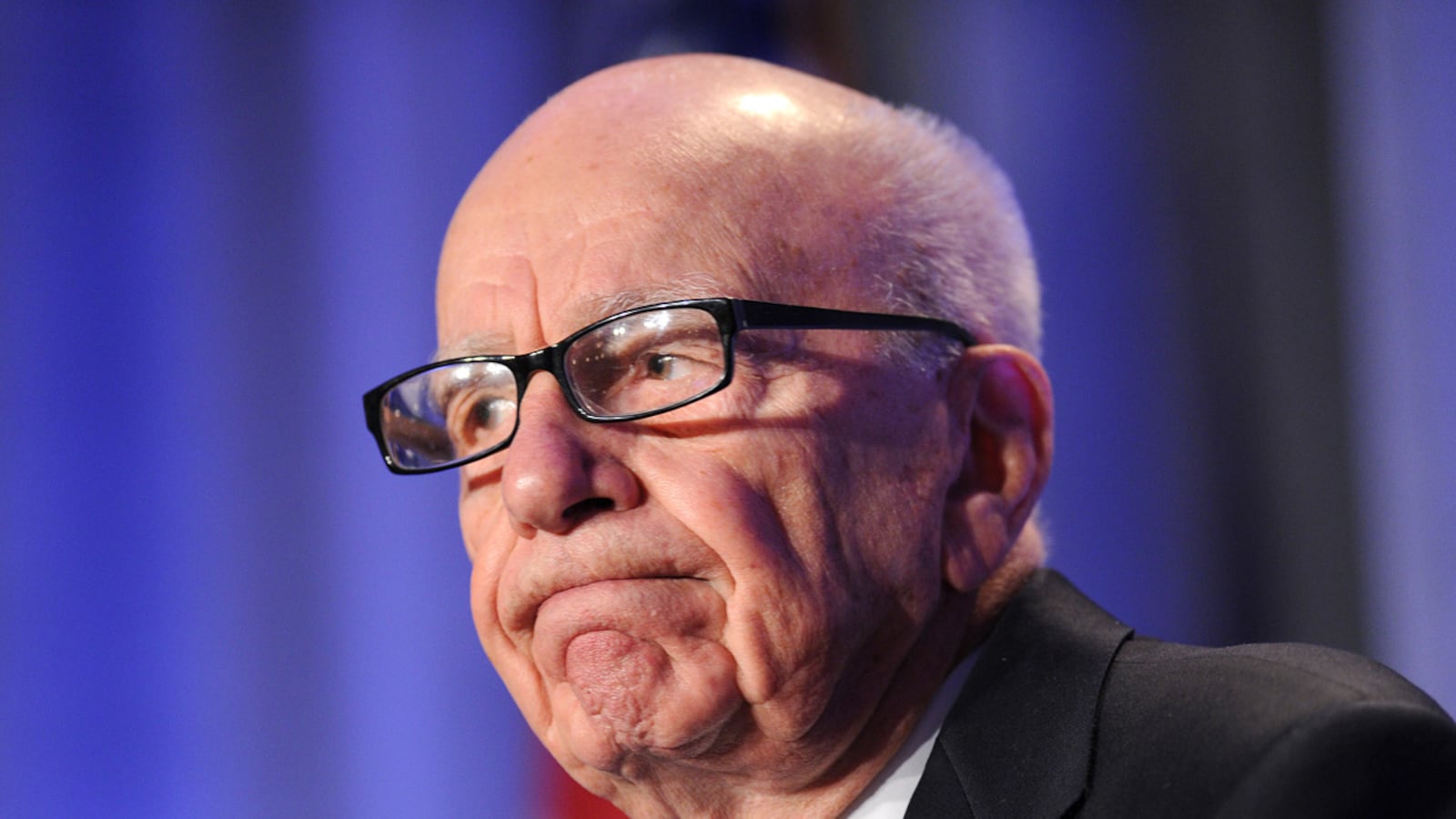While phone-hacking allegations have engulfed Rupert Murdoch’s newspapers in Britain, a major data dump of emails in Australia could see the scandal go global—to News Corp.’s worldwide pay-TV business.
Though the revelations of industrial phone hacking and police bribery at the London subsidiary, News International, have led to three police investigations, shuttered the best-selling English-language newspaper, News of the World, and forced News Corp. to drop a $12.4 billion takeover bid for the remainder of the lucrative satellite broadcaster, BSkyB, it looked like a retreat rather than a rout.
The scandal may have ruined James Murdoch’s claim to be heir apparent to his father: he has dropped all his U.K. publishing directorships and returned to New York. But newspaper publishing accounts for less than 10 percent of annual revenues for the world’s third-largest media conglomerate. News Corp. is a global company and derives most of its income from major TV interests in Europe, Australia, Asia, Latin America, and of course, the Fox Network in the U.S.
News Corp.’s share price has bounced back from the traumas of the summer, despite the ongoing costs of civil lawsuits by phone-hacking victims that had already reached $200 million by January this year. Ongoing U.S. investigations were looking likely to end in large fines due under the Foreign Corrupt Practices Act. Given a $50 billion capitalization, News Corp. itself seemed secure.
Three recent revelations in the last two days, however, go beyond intrusions into personal privacy and threaten News Corp.’s core business of broadcasting, satellite, and pay television.
On Monday night, the BBC’s flagship current affairs program, Panorama, detailed allegations that a News Corp. subsidiary, NDS, had hacked and distributed the proprietary code of the pay-TV access cards of a rival broadcaster, ITV Digital, which closed in 2002 due to massive losses, partly incurred by piracy.

The following morning, The Independent newspaper in London also detailed allegations that an Italian hacker who had cracked and pirated rival satellite channels in Italy was in the pay of News Corp. through News International.
Soon after, the Financial Review in Australia published claims that the same concerted dirty tricks had crippled an Australian pay-TV channel that News Corp. is in the process of acquiring. After four years of investigation, the author and journalist Neil Chenoweth says he is in possession of documents that support the allegations of Panorama and The Independent: a cache of 14,400 emails from the former head of NDS security, Ray Adams, that has been uploaded for analysis in a WikiLeaks-style data dump.
NDS is a News Corp. subsidiary based in London and Haifa, Israel, that manufactures the set-top boxes, encryption codes, and smart cards that are the keys to the “conditional access” pay-TV model. Having apparently proved itself much more secure than rival services, NDS dominates with a 75 percent share of the market. News Corp. sold the company to Cisco Systems for $5 billion last week, though the deal won’t close till the second half of this year.
NDS denies it was ever involved in piracy and claims its hacking activities were legitimate and preventive. If these emails are genuine (and Neil Chenoweth told The Daily Beast that a legal take-down notice from NDS’s lawyers would suggest they are), it would indicate that NDS had an unfair competitive advantage over its rivals. Multiple emails talk about hacks and piracy of rival companies. One example copied to Ray Adams on Nov 21, 1999, at 1:39 p.m. exclaims “Yes the Ondigital hack is working fine …” Chernoweth, who was inspired to dig deeper because of the culture and practices revealed by the phone-hacking scandal in Britain, told The Daily Beast these emails provide an “insight into the life of senior figures.”
Ray Adams retired in 2002, by which time NDS security had become Operational Security under the leadership of Reuven Hasak, a former director of Shin Bet, Israel’s internal security organization. Historically, the group reports directly to the office of the chairman of News Corp.—none other than Rupert Murdoch himself.
Chenoweth thinks the scale of these revelations could easily outstrip anything so far in the News Corp. saga: "The phone hacking in Britain revealed intrusions into personal privacy, and caused reputational and succession damage to News Corp. But the costs will be only a few hundred million dollars. What you have here is an issue which caused five separate different lawsuits in the past against News Corp. from global corporations each claiming billions of dollars. I would estimate this is at least 50 times bigger than phone hacking."
With the British regulator, Ofcom, now investigating the piracy allegations in the U.K., this new tale of TV hacking—if substantiated—has the potential to do for News Corp.’s broadcasting business what phone hacking has done to News International’s papers.
Update: In a statement, News Corp. pushed back against the press firestorm launched by the Panorama investigation, accusing the BBC of "gross misrepresentation of NDS' role as a high-quality and leading provider of technology and services to the pay-TV industry."






